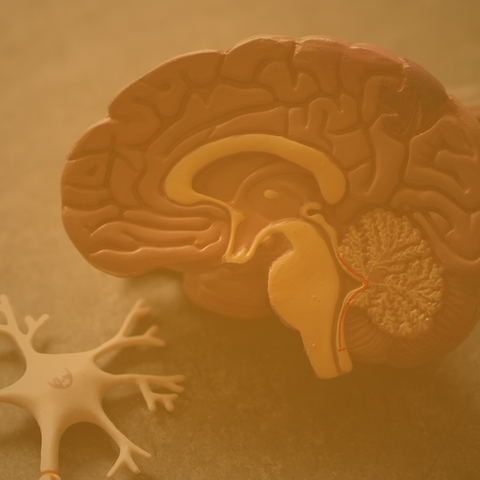
Creatine is one of the most popular and most studied supplements in the world of sports and fitness [1,2]. Countless athletes and recreational gym goers take creatine to boost strength and muscle gains from their training. You can read more on the effects of creatine on weight loss or gain here.
An unfortunate rumor has taken hold that hair loss is an accepted side effect of creatine use. In recent years, this concern has been the subject of headlines, blogs, and videos on social media. This misconception is largely based on anecdotal reports and a handful of studies suggesting that creatine raises levels of dihydrotestosterone (DHT), a potent androgen that is implicated in male pattern baldness.
In today’s article, we’ll look at the science behind this rumor, review the existing research, and offer practical guidance for those worried about hair loss.
What is creatine?
Creatine is a naturally occurring compound residing mainly in the muscle tissue [3] with smaller amounts elsewhere in the body. It acts as a high-energy fuel source for tissues that have considerable energy requirements, like muscle during high-intensity exercise [4].
Creatine is synthesized predominantly in the liver, kidneys, and pancreas from the amino acids glycine, arginine, and methionine [5]. We obtain creatine in the diet from red meat, fish, poultry, and dairy sources.
When supplementing with creatine, you increase the amount of phosphocreatine available in the muscle tissue. By doing this, more ATP (adenosine triphosphate, the energy currency of the cell) is made available to support high-intensity exercise. When paired with resistance training (typically 3-5 grams per day after an optional “loading” phase), creatine has been shown to improve strength, power output, and muscle mass [6-9].
How does hair grow, and what causes hair loss?
Hair growth occurs in cycles that are regulated by hormones, growth factors, and genetics. These cycles comprise anagen (growth), catagen (regression), telogen (rest), and exogen (shedding) [10,11]. Individual hair follicles cycle independently, and each one will undergo ten to thirty cycles in a lifetime. While most people have around 100,000 scalp hairs at any time, normal shedding of 100 to 150 telogen hairs takes place every day [12]. On balance, the density and number of total hair strands remain relatively stable under healthy conditions.
In androgenetic alopecia (common male‑pattern baldness), DHT binds to androgen receptors in susceptible hair follicles, shortening the growth phase of the hairs and making the follicles smaller over time. People with a genetic predisposition show increased sensitivity to even normal DHT levels.
How does creatine affect DHT?
An often-cited study from 2009 reported that seven days of creatine loading (25 grams per day) increased serum DHT by 56% [13]. A further 14 days of maintenance (5 grams per day) dosing showed that DHT levels were still 40% above baseline. Total testosterone did not significantly change during the study, but free testosterone was not measured. No markers of hair follicle health were measured, and hair loss itself was not directly measured either. Only 16 participants completed the study; it was only three weeks in duration, and the findings are yet to be replicated elsewhere.
There is, however, a very recent study that showed no effect of creatine supplementation on DHT levels or hair follicle health [14]. Forty-five resistance-trained males (aged 18-40 years) were recruited and randomly assigned to either creatine monohydrate (5 grams per day) or a placebo (5 grams maltodextrin per day). They maintained their usual diets and training regimes. Blood samples were collected at baseline and after 12 weeks to measure total testosterone, free testosterone, and DHT. Hair follicle health was assessed using the Trichogram test and the FotoFinder system (measuring hair density, follicular unit count, and cumulative hair thickness).
Thirty-eight participants completed the study, and the characteristics of the creatine and placebo groups were similar at baseline. While total testosterone increased and free testosterone decreased over time, these effects were independent of supplementation. DHT levels did not significantly change, and hair growth measures were similar between groups.
These findings, from a larger and longer-duration study than the 2009 paper, strengthen the evidence that creatine supplementation does not affect hair growth parameters in resistance-trained males. Exercise alone can increase DHT levels both acutely and over time [15,16].
Does increased DHT automatically mean hair loss will happen?
Undoubtedly, DHT has a key role in androgenetic alopecia [17,18]. However, raising systemic levels does not necessarily guarantee that hair loss will accelerate in all people. Hair follicles vary in how sensitive they are to DHT. A transient or moderate rise may be insufficient to trigger follicular miniaturization in individuals without a genetic predisposition, whereas normal levels might be enough in people with such a predisposition.
What should you do if you're concerned about hair loss?
- A family history of early male-pattern baldness is the strongest predictor of future hair loss, so this could be worth looking into.
- Consulting a dermatologist or endocrinologist can be very useful if you notice increased shedding. They can help rule out any other factors that may be contributing to hair loss.
- Maintaining appropriate nutrition, especially protein and micronutrients, is essential for supporting hair follicle health.
- A discussion with your healthcare provider about hair loss medication (i.e., finasteride) might be appropriate if you are concerned about shedding.
Conclusion
The research evidence is mixed on the role of creatine in modulating DHT levels. Only a single small study has shown a transient DHT increase with high‑dose creatine, whereas a more recent, longer-duration trial showed no impact of creatine on DHT levels or hair follicle health parameters. Reviews and expert opinion pieces have concluded that there is no direct evidence that creatine causes hair loss; however, there is a need for more targeted studies on this research question.
Individuals with a genetic predisposition to androgenetic alopecia should monitor hair health closely, but for the overwhelming majority of users, creatine remains a safe and effective ergogenic aid without appreciable risk of hair loss.
References
[1] B. Wax, C.M. Kerksick, A.R. Jagim, J.J. Mayo, B.C. Lyons, R.B. Kreider, Creatine for Exercise and Sports Performance, with Recovery Considerations for Healthy Populations, Nutrients 13 (2021) 1915. https://doi.org/10.3390/nu13061915.
[2] R.B. Kreider, D.S. Kalman, J. Antonio, T.N. Ziegenfuss, R. Wildman, R. Collins, D.G. Candow, S.M. Kleiner, A.L. Almada, H.L. Lopez, International Society of Sports Nutrition position stand: safety and efficacy of creatine supplementation in exercise, sport, and medicine, Journal of the International Society of Sports Nutrition 14 (2017) 18. https://doi.org/10.1186/s12970-017-0173-z.
[3] R.B. Kreider, J.R. Stout, Creatine in Health and Disease, Nutrients 13 (2021) 447. https://doi.org/10.3390/nu13020447.
[4] A.M. Persky, G.A. Brazeau, Clinical pharmacology of the dietary supplement creatine monohydrate, Pharmacol Rev 53 (2001) 161–176.
[5] D.A. Bonilla, R.B. Kreider, J.R. Stout, D.A. Forero, C.M. Kerksick, M.D. Roberts, E.S. Rawson, Metabolic Basis of Creatine in Health and Disease: A Bioinformatics-Assisted Review, Nutrients 13 (2021) 1238. https://doi.org/10.3390/nu13041238.
[6] J. Antonio, D.G. Candow, S.C. Forbes, B. Gualano, A.R. Jagim, R.B. Kreider, E.S. Rawson, A.E. Smith-Ryan, T.A. VanDusseldorp, D.S. Willoughby, T.N. Ziegenfuss, Common questions and misconceptions about creatine supplementation: what does the scientific evidence really show?, Journal of the International Society of Sports Nutrition 18 (2021) 13. https://doi.org/10.1186/s12970-021-00412-w.
[7] E.S. Rawson, J.S. Volek, Effects of Creatine Supplementation and Resistance Training on Muscle Strength and Weightlifting Performance, J Strength Cond Res 17 (2003) 822. https://doi.org/10.1519/1533-4287(2003)017<0822:EOCSAR>2.0.CO;2.
[8] S.-H. Wu, K.-L. Chen, C. Hsu, H.-C. Chen, J.-Y. Chen, S.-Y. Yu, Y.-J. Shiu, Creatine Supplementation for Muscle Growth: A Scoping Review of Randomized Clinical Trials from 2012 to 2021, Nutrients 14 (2022) 1255. https://doi.org/10.3390/nu14061255.
[9] J. Mielgo-Ayuso, J. Calleja-Gonzalez, D. Marqués-Jiménez, A. Caballero-García, A. Córdova, D. Fernández-Lázaro, Effects of Creatine Supplementation on Athletic Performance in Soccer Players: A Systematic Review and Meta-Analysis, Nutrients 11 (2019) 757. https://doi.org/10.3390/nu11040757.
[10] Z. Yue, F. Yang, J. Zhang, J. Li, C.-M. Chuong, Regulation and dysregulation of hair regeneration: aiming for clinical application, Cell Regen 11 (2022) 22. https://doi.org/10.1186/s13619-022-00122-x.
[11] N. Natarelli, N. Gahoonia, R.K. Sivamani, Integrative and Mechanistic Approach to the Hair Growth Cycle and Hair Loss, JCM 12 (2023) 893. https://doi.org/10.3390/jcm12030893.
[12] S. Harrison, W. Bergfeld, Diffuse hair loss: Its triggers and management, CCJM 76 (2009) 361–367. https://doi.org/10.3949/ccjm.76a.08080.
[13] J. Van Der Merwe, N.E. Brooks, K.H. Myburgh, Three Weeks of Creatine Monohydrate Supplementation Affects Dihydrotestosterone to Testosterone Ratio in College-Aged Rugby Players, Clinical Journal of Sport Medicine 19 (2009) 399–404. https://doi.org/10.1097/JSM.0b013e3181b8b52f.
[14] M. Lak, S.C. Forbes, D. Ashtary-Larky, S. Dadkhahfar, R.M. Robati, F. Nezakati, M. Khajevandi, S. Naseri, A. Gerafiani, N. Haghighat, J. Antonio, G.M. Tinsley, Does creatine cause hair loss? A 12-week randomized controlled trial, Journal of the International Society of Sports Nutrition 22 (2025) 2495229. https://doi.org/10.1080/15502783.2025.2495229.
[15] K. Sato, M. Iemitsu, K. Matsutani, T. Kurihara, T. Hamaoka, S. Fujita, Resistance training restores muscle sex steroid hormone steroidogenesis in older men, FASEB j. 28 (2014) 1891–1897. https://doi.org/10.1096/fj.13-245480.
[16] A.A. Smith, R. Toone, O. Peacock, S. Drawer, K.A. Stokes, C.J. Cook, Dihydrotestosterone is elevated following sprint exercise in healthy young men, Journal of Applied Physiology 114 (2013) 1435–1440. https://doi.org/10.1152/japplphysiol.01419.2012.
[17] E.T. Ustuner, Cause of Androgenic Alopecia: Crux of the Matter, Plastic and Reconstructive Surgery Global Open 1 (2013) e64. https://doi.org/10.1097/GOX.0000000000000005.
[18] R.M. Trüeb, Molecular mechanisms of androgenetic alopecia, Experimental Gerontology 37 (2002) 981–990. https://doi.org/10.1016/S0531-5565(02)00093-1.





Comments (0)
There are no comments for this article. Be the first one to leave a message!